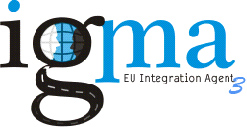The IGMA methodology makes use of already tested approaches in the area of Life Long learning regarding the issues of active citizenship, labour market integration, adult education and counselling.
Active Citizenship:
In the European Union this concept refers to people’s integration in the society: not only by having paid work but also through education, one’s contacts as well as one’s capacity to enter and/or participate in voluntary work or in cultural events. However, not everybody is active in the same way. The Active Citizenship Scale indicates at what level people are active, and suggests well-arranged activities which can help people to become more active. How to use this scale is integrated in the IGMA methodology. To read more proceed to http://www.socialempowerment.eu/
Life Long Learning:
Staying an active citizen in a constantly changing world will put some constraints on people’s basic competences to participate in Life Long Learning. For everybody but especially for low skilled unemployed it is important to have these basic competences. The European Commission has discerned 8 so-called key competences which people need to have to be able to contribute to the society in a sustainable way. These key competences are: Mother Tongue, English, Mathematics, ICT, Communication, Entrepreneurship, Citizenship and Learning to Learn. Targeting these key competences is integrated in the IGMA methodology. To read more proceed to http://www.prerf.eu
IGMA 1:
The IGMA methodology has been developed and tested with the support of the European Commission in the project IGMA 1 during 2012 -2014. For more information on the IGMA methodology proceed to http://www.prerf.eu/en/
